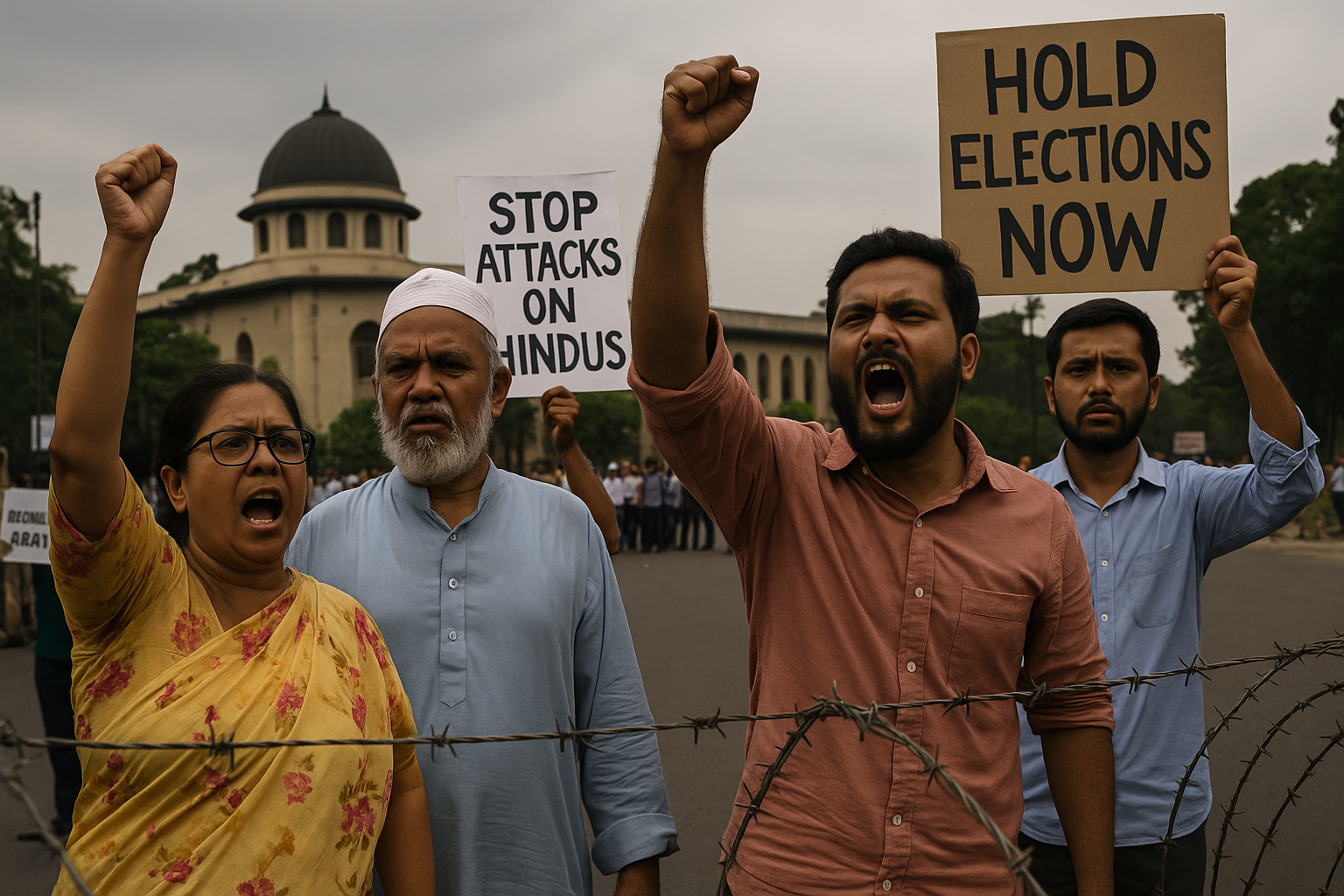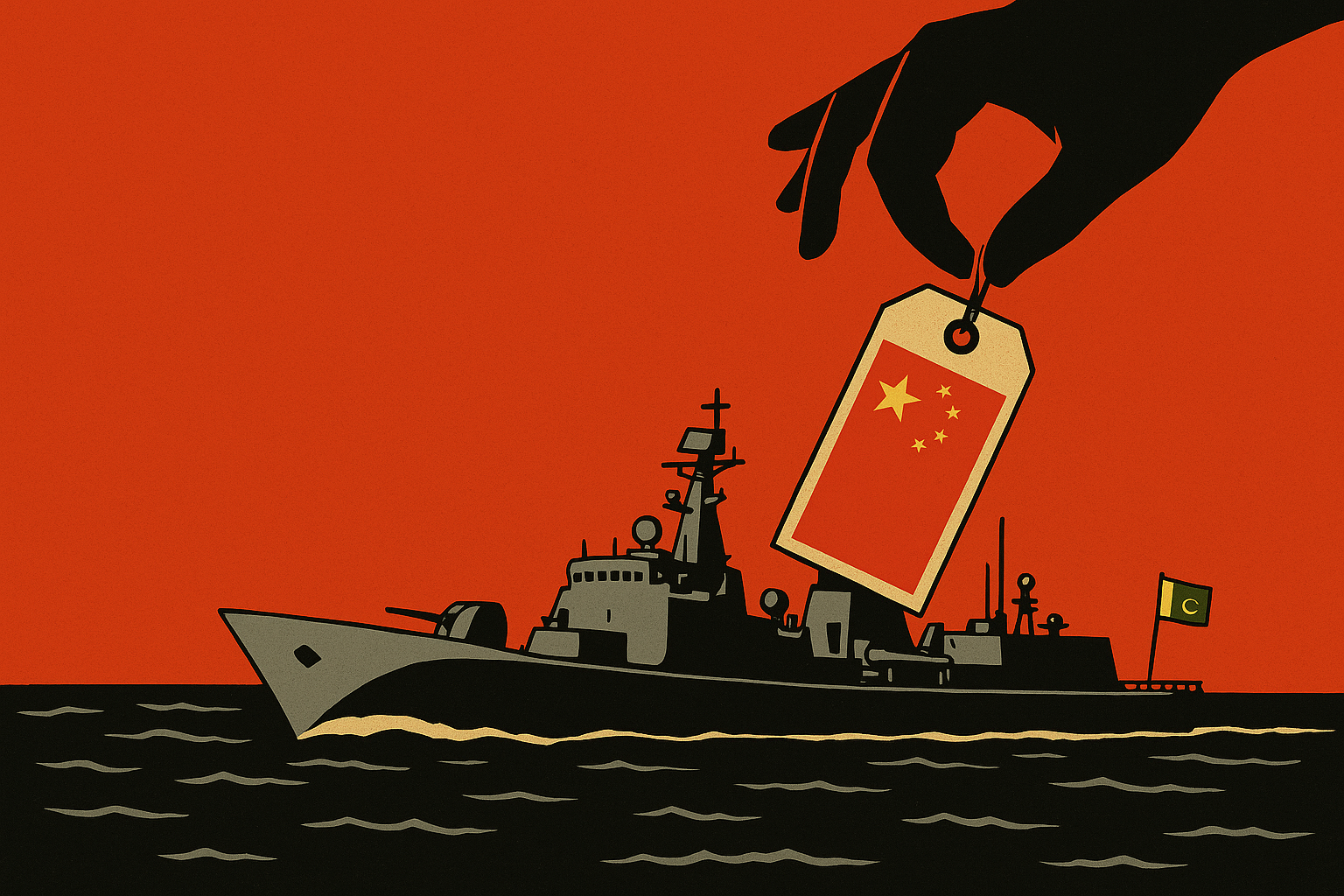A Nation Adrift: Yunus’s Interim Government Deepens Bangladesh’s Political and Communal Faultlines

Image generated by AI: Courtesy; DALL-E
Nearly a year after Sheikh Hasina’s ouster in August 2024, Bangladesh remains politically paralysed, socially polarised, and increasingly unstable. The interim government led by Nobel Peace Prize laureate Muhammad Yunus—initially welcomed as a neutral caretaker regime—has instead drawn the country into a deeper crisis.
Yunus, long known for his pioneering work in microfinance through Grameen Bank, was thrust into political leadership during a moment of national upheaval. Entrusted with restoring democratic order and overseeing free and fair elections, his administration has since veered into authoritarian territory—marked by communal unrest, institutional defiance, and growing economic disquiet.
A Fractured Promise of Transition
The expectations surrounding Yunus’s elevation were high. With Sheikh Hasina’s departure following mass protests over alleged democratic backsliding and economic mismanagement, Yunus’s international standing was seen as a buffer against domestic factionalism.
Instead, the transitional authority has presided over deteriorating social cohesion, heightened minority insecurity, and escalating friction with both the judiciary and the armed forces. Elections—ostensibly the primary mandate of the interim government—remain indefinitely postponed, raising fears of a creeping entrenchment of power.
A Surge in Targeted Violence
Among the most troubling developments during the Yunus administration has been the sharp rise in communal violence. Rights organisations and local observers report a surge in attacks on Bangladesh’s Hindu population. Since August 2024, India’s Parliament has recorded at least 23 deaths and 152 temple attacks linked to communal unrest in Bangladesh. Human rights monitors suggest the actual toll is far higher.
More than 1,200 targeted attacks on temples, homes and businesses have been recorded across Dhaka, Chattogram, and Khulna, with victims describing coordinated mob actions and inadequate police response. The Bangladesh Hindu Bouddho Christian Oikyo Parishad, the country’s largest minority organisation, reported 258 incidents of violence against minority communities in the first half of 2025 alone—including 59 attacks on religious sites and 20 cases of rape. A recent NGO survey found that 72 per cent of Hindus in rural Bangladesh feel unsafe and would emigrate if they had the means.
The persistence of such violence, and the state’s failure to respond effectively, has raised serious concerns about tacit complicity or indifference within the interim administration.
Institutional Paralysis and Legal Standoff
The dysfunction extends to the highest levels of governance. The Dhaka South City Corporation remains stalled due to an ongoing battle over the mayoral office. Although a court ordered that BNP-backed leader Ishraque Hossain be installed, the interim government has not complied, instead filing an appeal with the High Court to prevent his swearing-in. The Election Commission, notably, did not object to the original verdict.
Simultaneously, Yunus’s government has drawn the ire of public sector unions over a contentious new ordinance granting wide latitude to dismiss civil servants for misconduct. The legislation has been denounced as unconstitutional and punitive, with striking employees branding it a “black law.” The backlash has paralysed portions of the bureaucracy, even as Yunus’s advisors defend the measures as essential for administrative reform.
Business Community Alarmed
The business sector, once cautiously optimistic about a political reset, has turned hostile. The Federation of Bangladesh Chambers of Commerce and Industries (FBCCI), along with other leading industry bodies, has condemned what it describes as a “rapidly deteriorating business climate.”
In a dramatic public statement, business leaders compared Yunus’s crackdown on entrepreneurs to the 1971 targeting of intellectuals by the Pakistan Army—an incendiary reference that signals the depth of their alarm. Concerns over arbitrary enforcement, lack of regulatory clarity, and political interference have compounded as layoffs increase and consumer sentiment plunges.
With Bangladesh’s fragile garment sector already under pressure from shifting global demand and rising costs, the added uncertainty risks pushing key exporters to relocate production elsewhere.
Tensions with the Armed Forces
The interim government’s troubles are not confined to the civilian sphere. Friction is growing between Yunus’s administration and the military over continued delays in election scheduling and a controversial security proposal to create a humanitarian corridor into Myanmar’s Rakhine state.
While the proposal was ostensibly driven by humanitarian concerns, it has been criticised as a strategic miscalculation—one that risks entangling Bangladesh in the complex ethnic conflict across the border and straining relations with the military establishment.
So far, the armed forces have remained publicly non-committal, but military officials have reportedly expressed frustration in private over what they perceive as political overreach and disregard for national security sensitivities.
An Uncertain Future
The central question confronting Bangladesh remains unanswered: when will elections be held? Despite repeated assurances from the interim leadership, no credible timeline has been announced. Yunus’s defenders argue that deteriorating law and order makes polls unfeasible in the short term. Critics, however, view these delays as politically expedient and fundamentally undemocratic.
For a leader who once symbolised people-centric development and civil empowerment, Yunus’s record in office is beginning to resemble the very patterns of elite impunity and institutional erosion that brought down his predecessor.
Bangladesh today finds itself suspended in political limbo. Minority communities feel abandoned, civil institutions are gridlocked, and economic confidence is evaporating. The promise of democratic correction that accompanied Yunus’s rise has given way to uncertainty—and a growing fear that the interim may become indefinite.







